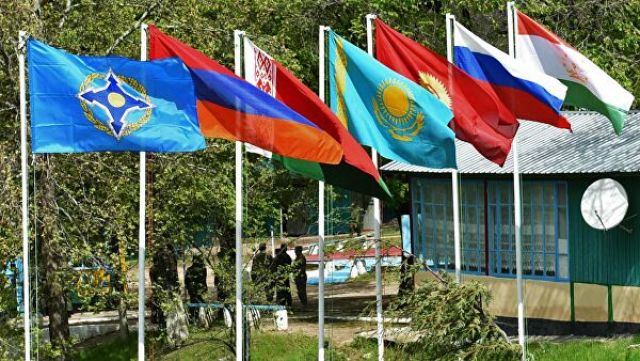TSAMTO, May 17. On May 16, Moscow hosted a meeting of the leaders of the CSTO member states dedicated to the 30th anniversary of the signing of the Collective Security Treaty and the 20th anniversary of the creation of the CSTO.
The meeting was attended by Prime Minister of the Republic of Armenia Nikol Pashinyan, President of the Republic of Belarus Alexander Lukashenko, President of the Republic of Kazakhstan Kassym-Jomart Tokayev, President of the Kyrgyz Republic Sadyr Zhaparov, President of the Russian Federation Vladimir Putin and President of the Republic of Tajikistan Emomali Rahmon.
The members of the Collective Security Council of the CSTO discussed the situation in the area of responsibility of the Organization, the prospects for its development and adopted a Statement dedicated to the anniversary of the CSTO. The Decision of the Collective Security Council of the Collective Security Treaty Organization "On awarding awards of the Collective Security Treaty Organization to participants of the CSTO peacekeeping operation on the territory of the Republic of Kazakhstan" was also signed.
The event was also attended by the Secretary General of the CSTO Stanislav Zas. He informed the media about the results of the leaders' meeting:
The statement of S. Zas is given below in the statement of the CSTO press service.
"During the meeting, the state of international and regional security was discussed. The assessment of the role and place of our Organization in international relations is given and the prospects for its development are determined.
During the discussion, the heads of State noted that the number of security challenges and threats not only in the area of responsibility of the Organization, but also in the whole world is steadily growing.
A serious challenge for the CSTO member states was the sharp increase in the aggressiveness of world powers and military-political blocs towards the Russian Federation and its allies.
NATO's military presence is expanding in the Eastern European region, military infrastructure is being built up, and the intensity of operational and combat training activities is increasing. Military spending is increasing significantly. New European states are being drawn into the alliance.
Modern weapons are being supplied to Ukraine in growing volumes.
Despite the positive results in the negotiation process between Armenia and Azerbaijan, tensions remain in the Caucasus region. Armed incidents do not stop on the Armenian-Azerbaijani border. Under these conditions, the Russian peacekeeping contingent plays an important role in stabilizing the situation, ensuring the fulfillment of the terms of the Trilateral Agreements of November 9, 2020.
Afghanistan remains a serious destabilizing factor in the Central Asian region. Threats emanating from the Afghan territory, including terrorism and drug trafficking, not only persist, but may also become more acute as the socio-economic situation in this country deteriorates.
Thus, unfortunately, the situation along the entire perimeter of the borders of the CSTO member states remains tense.
Of course, these negative processes are taken into account in our activities. We continue to develop the existing collective security systems, peacekeeping potential, and also improve crisis response mechanisms.
Following today's meeting, the leaders of the States adopted a Statement by the Collective Security Council of the Collective Security Treaty Organization in connection with the 30th anniversary of the Collective Security Treaty and the 20th anniversary of the Collective Security Treaty Organization.
It notes that the choice we made in favor of joining efforts to maintain peace in the Eurasian space has stood the test of time. The Treaty, concluded in 1992, fulfills its main task of ensuring collective security and stability, territorial integrity and sovereignty of the States participating in it.
The Statement expressed readiness to ensure the security of the borders of the CSTO zone of responsibility and expressed concern about the selective application of universally recognized norms and principles of international law, unwillingness to reckon with the legitimate interests of sovereign states, interference in their internal affairs, the use of unilateral sanctions and restrictions in violation of the prerogatives of the UN Security Council, manifestations of double standards.
The document notes that the efforts made to strengthen the Organization and its adaptation to the current geopolitical situation have made it possible to form an effective system of collective security and countering challenges and threats. The CSTO has raised the cooperation of the member states to a qualitatively new level of allied relations, has accumulated significant potential to counter a wide range of modern challenges and threats, and has become an important factor of peace and stability in the Eurasian space.
I would also like to inform you that today the Decision of the Collective Security Council was signed on awarding the CSTO awards to the most distinguished participants of the CSTO peacekeeping operation in the territory of the Republic of Kazakhstan.
During today's meeting of the leaders of the CSTO member states, a number of instructions were given on our further activities."
For reference:
In 2022, the Republic of Armenia will preside over the Collective Security Treaty Organization.
The Collective Security Treaty (CSTO) was signed on May 15, 1992 in Tashkent. On May 14, 2002, the Collective Security Council, at its session in Moscow, decided to transform the mechanisms and structures of cooperation of the CSTO member States into an international regional organization - the "Collective Security Treaty Organization", giving it the appropriate status. September 18, 2003 The CSTO Charter has entered into force. The Collective Security Treaty Organization includes: the Republic of Armenia, the Republic of Belarus, the Republic of Kazakhstan, the Kyrgyz Republic, the Russian Federation and the Republic of Tajikistan.

